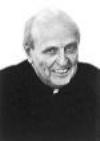|
Issue Date: June 20, 2003
By ROBERT F. DRINAN Every morning in America over 45 million children in school rise, hold their right hands to their hearts and recite the Pledge of Allegiance to their country “under God.” A federal Court of Appeals in California has ruled that “under God” is an unconstitutional practice because in essence it forces children to profess a belief in God. President Bush said that the ruling is “ridiculous.” In March the U.S. House of Representatives had a long debate in which the thesis seemed to be that the republic would collapse if judges could turn schoolchildren into infidels. The vote in favor of the flag salute with the reference to the divine was virtually unanimous with a few abstaining. The rhetoric and the proclamations of the necessity of God in the lives of children and of the nation were almost offensive. Politicians think that their invocation of God can help them get reelected. The fact is that neither the religions of America nor the educators had anything to do with the federal demand that every child recite the Pledge of Allegiance including the phrase, “under God.” It was the politicians who in 1954, with the benign blessing of President Eisenhower, decreed that all children must publicly assert each day that their country is “under God.” The atmospherics made it clear that the United States was proclaiming its belief in the divine to counter the atheism of the newly emerged Soviet bloc. There may be excusal provisions, but the fact is that Congress and not the nation’s educators or its religious leaders compel every young person to proclaim a faith in the divine origin of the United States. The decision to ban “under God” has a certain plausibility since the U.S. Supreme Court has forbidden prayers in school, Bible readings and minutes of silence. Indeed the court has even forbidden prayers recited by students at a football game. The plaintiff in the California case, Michael Mewdow, brought action to spare his daughter from the compelled reference to God. His case has a certain logic to it, but it aroused anger and opposition to a degree almost incredible. Since there is another federal Circuit Court of Appeals which allowed the words “under God,” it seems that the U.S. Supreme Court will review the issue. The most knowledgeable critics of the court are predicting that the “under God” phrase will survive. Many religious citizens find comfort in deistic references on the currency, in the taking of oaths and in the word about God with which the U.S. Supreme Court convenes. Indeed, the survival of these pious references seems to let millions of people think that somehow the nation is uniquely chosen and blessed by God. The attachment to civil piety may seem to many to be casual and unreflective. But the storm over the proposal that the recital of “under God” be not compulsory for schoolchildren somehow has caused an uproar. The protesters say unthinkingly that the phrase is not really religious, that it will not harm anyone and that too much about religion has already been taken out of the nation’s public piety. Indeed the almost frantic desire to retain “under God” derives from a deeper fear that the country is becoming too secular and that it will lose its virtue if it gives up its public faith in God. Again, it is not religious leaders or educators who are saying these things. It is the politicians. If the Supreme Court bans the phrase “under God,” the politicians will revile the nation’s highest court and restore “under God.” It is unlikely that the Catholic bishops will intervene in the probable Supreme Court case. But Catholics will share the anxieties of those millions of people who want their legal institutions to reinforce their faith in God. The silent onlookers will be the 100 million Americans who do not belong to any organized religion. They may not feel strongly about the issue, but they sympathize with Michael Mewdow and his daughter. The Second Vatican Council’s “Declaration on Religious Freedom” has enormous relevance to this question. That document forbade any discrimination against those who are not persons of faith. Indeed, Vatican II banned even the shadow of “coercion” that is based on the lack of faith. It would be wholesome for all religious groups in America to have a broad-based dialogue on the essential question of whether people of faith are being honest with themselves and their fellow citizens who do not have faith if they insist that the law compels believers and nonbelievers to assert that the country is “under God.” It also matters a great deal what 45 million children think about their faith and their nation when they are required on some 180 days a year to proclaim that their nation is “under God.” Jesuit Fr. Robert F. Drinan is a professor at Georgetown University Law Center. National Catholic Reporter, June 20, 2003 |
 Insistence on ‘under God’ is a political, not religious,
move
Insistence on ‘under God’ is a political, not religious,
move